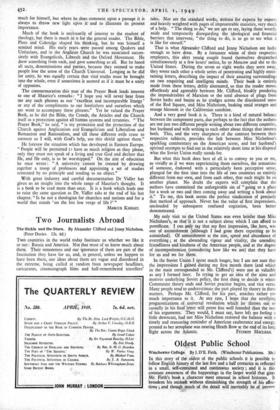Two Journalists Abroad
The Sickle and the Stars. By Alexander Clifford and Jenny Nicholson. (Peter Davies. 12s. 6d.)
Two countries in the world today fascinate us whether we like it or not : Russia and America. Not that most of us know much about them. Their remoteness and our ignorance of them are part of the fascination they have for us, and, in general, unless we happen to have been there, our ideas about them are vague and disordered in the extreme, being culled at random from newspaper headlines, caricatures, cinematograph ails and half-remembered travellers'
tales,. Nor are the standard works, written for experts by experts and heavily weighted with pages of impenetrable statistics, very much of a help. " The thing to do," we are apt to say, laying them wearily aside and temporarily disregarding the ideological and financial barriers that intervene, " the thing to do, is to go to see what it is like for oneself."
That is what Alexander .Clifford and jenny Nicholson are lucky enough to hive done. By a fortunate whim of their respective employers, this alert young couple found themselves despatched simultaneously at a few hours' notice, he to Moscow and she to the_ United States. Dining the seven or eight weeks they were away, they wrote each other a whole series of penetrating and highly enter- taining letters, describing the impact of their amazing surroundings on two enquiring and intelligent minds. Their book is entirely made from these letters, deftly alternated, so that the reader moves effortlessly and agreeably between Mr. Clifford, bleakly pondering the imponderables of Marxism or the total absence of plugs from Soviet baths and basins as he trudges across the discoloured snow of the Red Square, and Miss Nicholson, basking amid oranges and orange blossom in the Californian sunshine.
And a very good book it is. There is a kind of natural balance between the component parts, due perhaps to the fact that the authors are not just two different people writing about two different countries, but husband and wife writing to each other about things that interest both. This, and the very sharpness of the contrast between their respective subjects, provides the link between Miss—NicholsOn's sparkling commentary on the American scene, and her husband's spirited attempts to find out in the relatively short time at his'disposal what the Soviet Union really stands for.
But what this book does best of all is to convey to you or me, as vividly as if we were experiencing them ourselves, the sensations of someone, endowed with a particularly keen perceptive sense, plunged for the first time into the life of two countries so entirely different from our own, and from each other, that each might be on another planet. No doubt the experts will complain that the authors have committed the unforgivable sin of " going to a place for a week or two and then coming away and writing a book about it To me, this book seems the perfect vindication of precisely that method of approach. Never has the value of first impressions, unclouded by subsequent confused cogitation, been better demonstrated.
My only visit to the United States was even briefer than Miss Nicholson's, so that it is not a subject about which I can afford to pontificate. I can only say that my first impression, like_ hers, was one of astonishment (although I had gone -there expecting to- be astonished). Of astonishment at the size, speed and abundance of everything ; at the abounding vigour and vitality, the unending friendliness and kindness of the American people, and at the degree of .incomprehension (considering how like we are) that they have for us and we for them.
In the Soviet Union I spent much longer, but I am not sure that the impressions I gained during my first month there (and which in the main corresponded to Mr. Clifford's) were not as valuable as any I formed later. In trying to get an idea of the aims and motives underlying Soviet policy, the first thing to decide is where Communist theory -ends and Soviet practice begins, and vice versa. Many people tend to underestimate the part played by theory in these matters. Perhaps Mr. Clifford, for his part, attaches rather. too much importance to it. = At . any rate, I hope that the terrifying prognostications of universal revolution, which he throws out so casually in his final letter will prove less well founded than the rest of his arguments. They would, I must say, have left me feeling .a little downcast, had not Miss Nicholson restored the balance with a timely and reassuring reminder of American exuberance and energy, penned as her aeroplane was nearing Heath Row at the end of its long






































 Previous page
Previous page